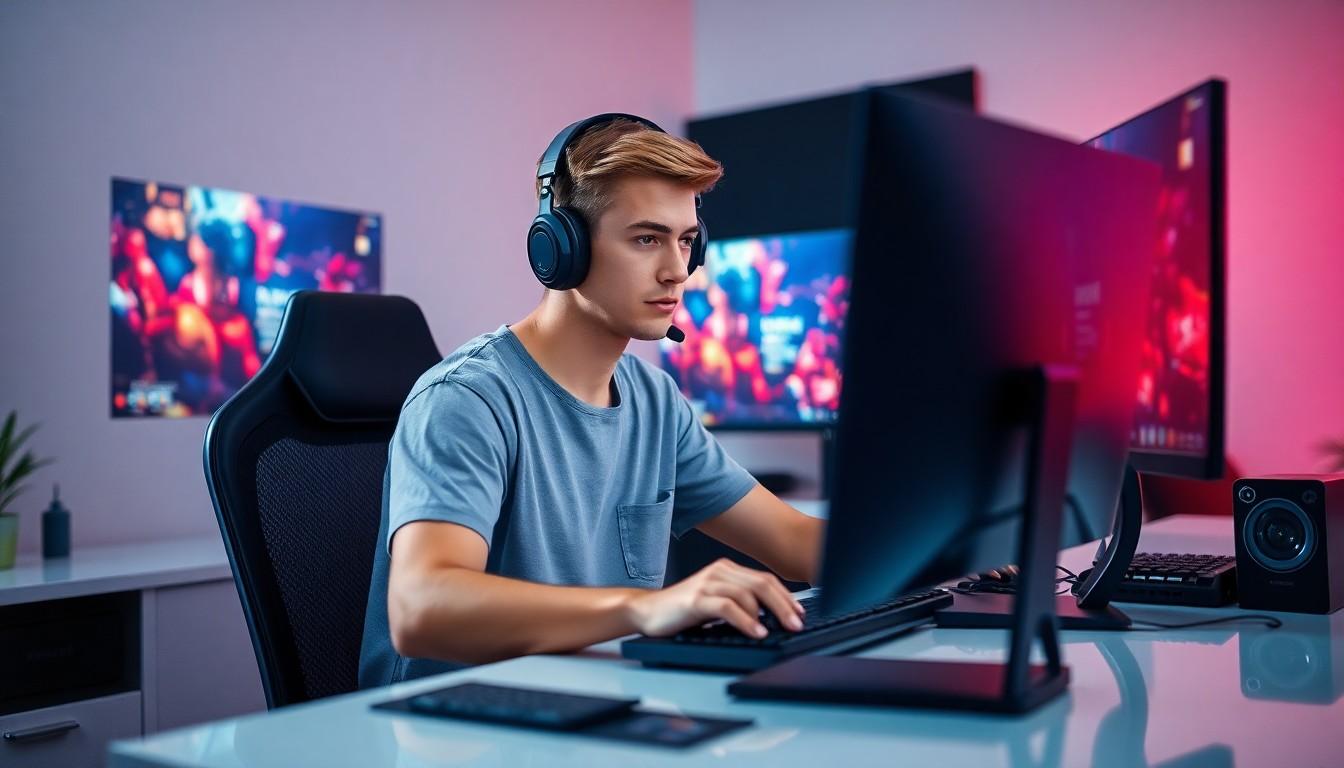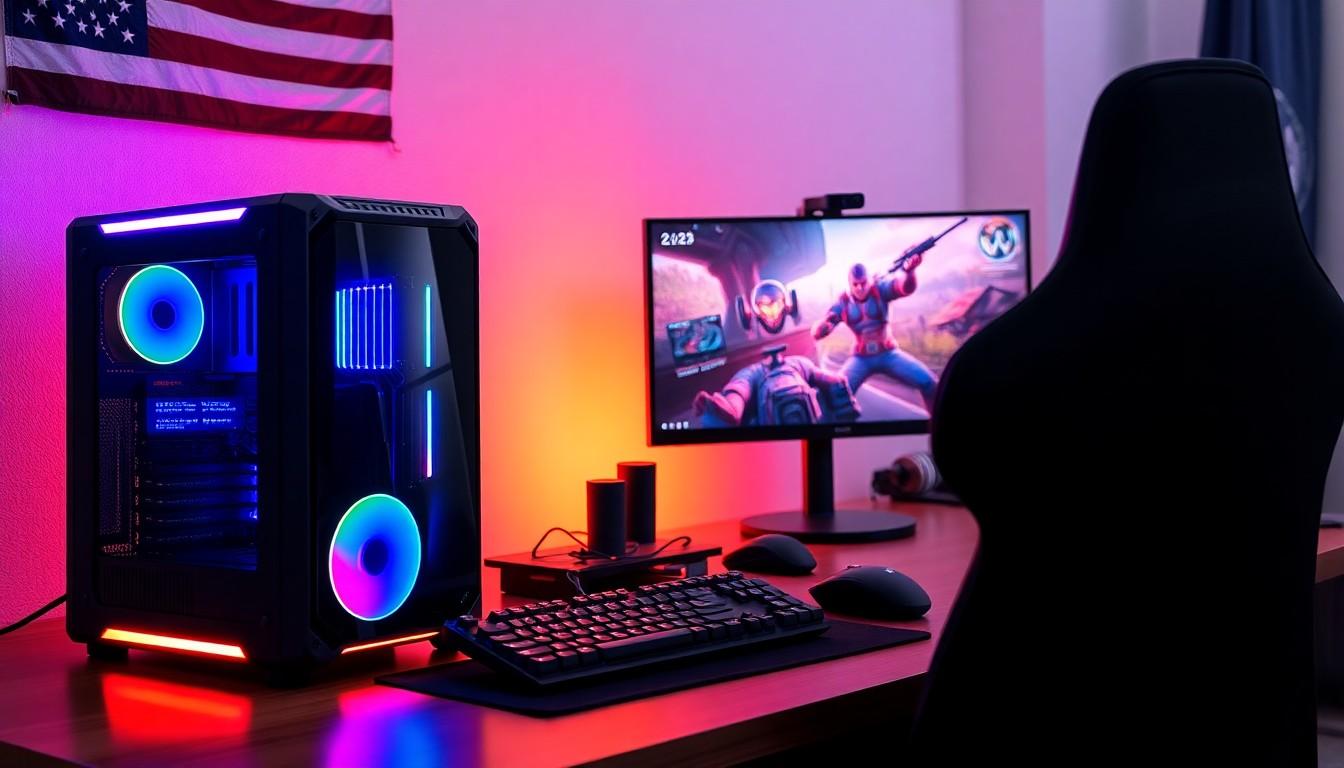When it comes to building the ultimate gaming PC, RAM is the unsung hero. Think of it as the brain’s short-term memory, juggling tasks faster than a caffeinated octopus. But how much RAM does a gamer really need? Too little, and they’ll be stuck staring at loading screens longer than a sloth on a lazy day. Too much, and they might as well be hoarding gold bars instead of playing games!
In a world where graphics are jaw-dropping and gameplay is intense, finding the sweet spot for RAM can make or break the experience. Whether it’s for casual gaming or high-octane eSports, understanding the right amount of RAM is crucial. So let’s dive into the nitty-gritty of memory requirements and ensure every gamer’s setup is as legendary as their skills.
How Much RAM Should a Gaming PC Have
RAM, or Random Access Memory, holds temporary data for quick access. Optimal RAM enhances system performance, impacting gaming experience and multitasking capabilities.
What Is RAM?
RAM is crucial for a computer’s functionality, acting as a workspace for active processes and applications. It provides quick retrieval and storage of information, allowing for seamless execution of tasks. Higher RAM capacity accommodates more applications running simultaneously. Each game has specific RAM requirements. Modern titles often recommend a minimum of 8GB, while demanding ones may need 16GB or more for optimal performance.
How RAM Affects Gaming Performance
Gaming performance connects directly to RAM capacity and speed. Insufficient RAM leads to lag during gameplay, especially in resource-intensive games. More RAM means better frame rates and smoother transitions between scenes. Loading times decrease, ensuring quicker access to in-game assets. Enhancements in graphics and effects usually require additional memory, stressing the importance of sufficient RAM for newer titles. Overall, the right amount of RAM positively influences the overall gaming experience, ensuring satisfaction during gameplay.
Recommended RAM for Gaming
Selecting the right RAM amount enhances overall gaming performance. Various factors influence these recommendations, including game requirements and user expectations.
Minimum RAM Requirements
Most modern games demand at least 8GB of RAM to function effectively. This baseline ensures that players experience fewer issues such as lag or slow loading times. Some titles might run with less memory, but performance issues often become apparent. Gamers who primarily enjoy older or less demanding games might find 8GB sufficient. For those anticipating a smoother experience, aiming for the minimum requirement is essential.
Optimal RAM Amount for Different Game Types
Competitive gamers benefit significantly from 16GB of RAM, as this allows for seamless multitasking. Fast-paced shooters and multiplayer online battle arenas (MOBAs) often require substantial memory to eliminate lag and increase responsiveness. Graphic-intensive single-player games may also show enhancements with 16GB. For immersive experiences or future-proofing, consider 32GB, especially for upcoming titles that may demand more resources. Balancing RAM amounts with specific gaming needs helps create the ideal setup for any gamer.
Factors Influencing RAM Needs
Various elements impact RAM requirements for a gaming PC. Understanding these factors helps tailor memory specifications for enhanced performance.
Game Resolution and Graphics Settings
Game resolution significantly affects memory demand. Higher resolutions like 4K need more RAM compared to standard 1080p. Graphics settings also play a crucial role; ultra settings increase texture details, requiring additional memory. Modern titles, especially those featuring complex graphics, can exceed standard requirements. For optimal performance at higher resolutions, 16GB or more of RAM is advisable.
Multitasking and Background Applications
Many gamers run additional applications while gaming. Multitasking with voice chat software or streaming platforms increases RAM consumption. Depending on background apps, 16GB may provide a smoother experience. Background processes vary, with some using negligible memory while others can demand significant resources. For those who frequently multitask, aiming for at least 16GB ensures seamless transitions between gaming and other activities.
Future-Proofing Your Gaming PC
Future-proofing a gaming PC requires careful consideration of RAM allocation based on emerging technological trends. Staying informed about upcoming gaming titles helps determine necessary memory specifications.
Upcoming Game Trends
Developers increasingly push the limits of graphics and processing power in new games. Anticipated releases often demand higher RAM capacities. Titles featuring immersive open worlds and advanced AI typically require at least 16GB, ensuring seamless gameplay. Gamers investing in a PC should consider the shift toward virtual reality and ray tracing. These features can lead to increased memory usage, making 32GB an appealing option for those wanting to be ahead of the curve. Prioritizing RAM alongside these evolving gaming trends guarantees a smoother experience for future titles.
Upgrading RAM
Upgrading RAM can enhance overall gaming performance, catering to heightened demands. Many gamers benefit from reassessing their current setups before making purchases. If a system runs on 8GB, finding room for an upgrade to 16GB often yields significant improvements, reducing lag during intense gameplay. Compatibility with the motherboard is crucial during upgrades. Different devices may support varying RAM speeds and capacities, so checking specifications is essential. Engaging in regular RAM assessments allows users to maximize their gaming experiences and adapt to ever-evolving requirements.
Enjoyable Gaming Experience
Finding the right amount of RAM for a gaming PC is essential for an enjoyable gaming experience. Gamers should consider their specific needs and the types of games they play. While 8GB may suffice for casual gaming, 16GB is often the sweet spot for competitive players and those who multitask.
For those looking to future-proof their systems or dive into more demanding titles, 32GB can provide peace of mind. As games evolve and system requirements increase, having adequate RAM ensures smoother gameplay and reduced lag. Regularly reassessing RAM needs can keep a gaming setup optimized and ready for the latest advancements in gaming technology.

